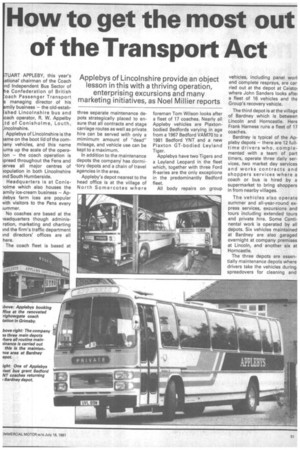How to get the most out of the Transport Act
Page 37

If you've noticed an error in this article please click here to report it so we can fix it.
Applebys of Lincolnshire provide an object lesson in this with a thriving operation, enterprising excursions and many marketing initiatives, as Noel Millier reports
TUART APPLEBY, this year's ationar chairman of the Coach nd Independent Bus Sector of e Confederation of British oach Passenger Transport s managing director of his mily business — the old-estab!shed Lincolnshire bus and oach operator, R. W. Appelby td of Conisholme, Louth, incolnshire.
Applebys of Lincolnshire is the ame on the boot lid of the cornany vehicles, and this name urns up the scale of the operaion — the coach operation is spread throughout the Fens and serves all major centres of mpulation in both Lincolnshire Ind South Humberside.
Headquarters is at Canis-mime which also houses the amily ice-cream business — Ap)lebys farm ices are popular with visitors to the Fens every summer.
Na coaches are based at the leadquarters though adminisration, marketing and charting ind the firm's traffic department Ind directors' offices are all here.
The coach fleet is based at three separate maintenance depots strategically placed to ensure that all contracts and stage carriage routes as well as private hire can be served with only a mimimum amount of "dead" mileage, and vehicle use can be kept to a maximum.
In addition to the maintenance depots the company has dormitory depots and a chain of travel agencies in the area.
Appleby's depot nearest to the head office is at the village of North Sornercotes where foreman Tom Wilson looks after a fleet of 17 coaches. Nearly all Appleby vehicles are Plaxtonbodied Bedfords varying in age from a 1967 Bedford VAM70 to a 1981 Bedford YNT and a new Plaxton GT-bodied Leyland Tiger.
Applebys have two Tigers and a Leyland Leopard in the fleet which, together with three Ford R-series are the only exceptions in the predominantly Bedford fleet.
All body repairs on group vehicles, including panel wonl and complete resprays, are car ried out at the depot at Caistoi where John Sanders looks aftei a fleet of 16 vehicles and thE Group's recovery vehicle.
The third depot is at the village of Bardney which is between Lincoln and Horncastle. Here Frank Harness runs a fleet of 17 coaches.
Bardney is typical of the Appleby depots — there are 12 fulltime drivers who, complemented with a team of part timers, operate three daily services, two market day services and works contracts and shoppers services where a coach or bus is hired by a supermarket to bring shoppers in from nearby villages.
The vehicles also operate summer and all-year-round express services, excursions and tours including extended tours and private hire. Some Continental work is operated by all depots. Six vehicles maintained at Bardney are also garaged overnight at company premises at Lincoln, and another six at Horncastle.
The three depots are essentially maintenance depots where drivers take the vehicles during spreadovers for cleaning and




















































